Tag: feeling stuck
Leaving the Good with the Bad
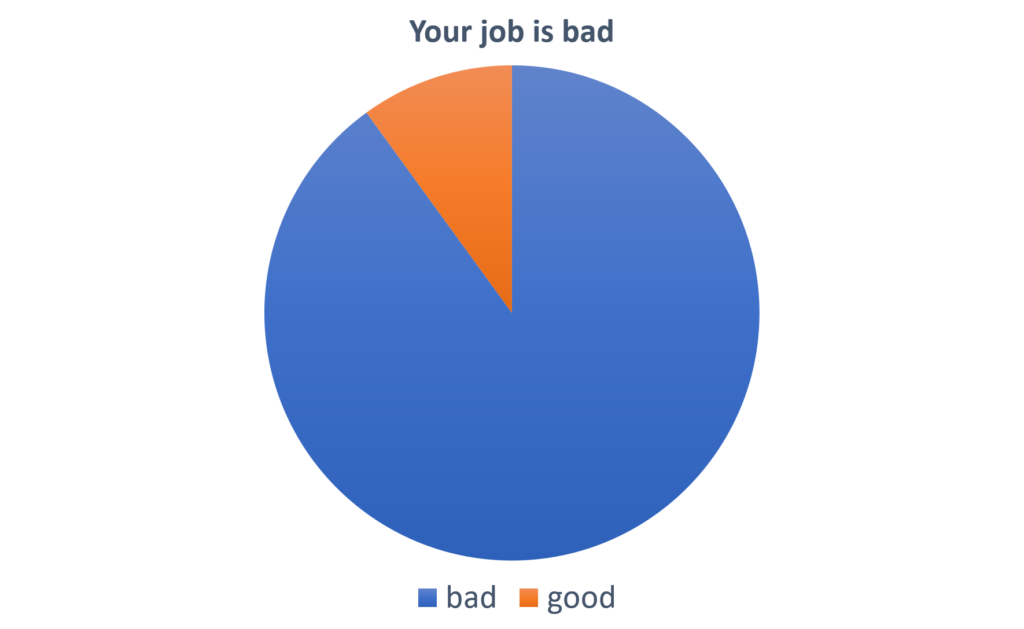 Rarely are bad jobs all bad. You might have an easy commute, nice work friends and decent wages mixed in with a nasty boss and brutal hours. One of the toughest hurdles to overcome when you are making up your mind to quit your job is accepting the loss of the good parts you will leave behind.
Rarely are bad jobs all bad. You might have an easy commute, nice work friends and decent wages mixed in with a nasty boss and brutal hours. One of the toughest hurdles to overcome when you are making up your mind to quit your job is accepting the loss of the good parts you will leave behind.
It is normal to cling to the positive parts within a bad situation. It has a purpose: it keeps you stuck in the decision-making phase, which is uncomfortable but not as scary as walking away from a significant aspect of your life and facing the uncertainties in your future.
It is also tempting to overemphasize the positive while downplaying the negative. But if you dread going to work and can’t shake off the stress when you’re done for the day, your job is bad for you. Even if you love the project you’re working on and got a raise last month, if your job makes you unhappy – it’s bad.
It’s ok to grieve your losses and be nervous about whether you’ll enjoy your next work position. Giving up something you care about isn’t easy. Deciding to let go of the good in order to be free from the bad is brave – and worth it.
Dealing with career disappointment
It is disappointing when you are not where you want to be in your career.
Maybe you thought by the time you were this age that you would be managing a department or earning a milestone salary.
Maybe you hop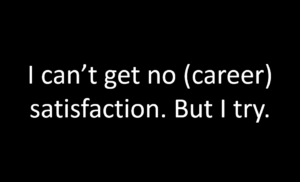 ed that after working this many years in your organization, that you would have been promoted by now.
ed that after working this many years in your organization, that you would have been promoted by now.
Maybe you expected that after the education and training you spent time and money on that you would enjoy your profession – but you don’t.
Or you’ve bounced from job to job and still don’t know what kind of job would make you happy.
I’ve met so many people that are frustrated with their careers for these reasons. The ones that are currently experiencing it often tell me that they feel defeated. They aren’t hopeful that they will ever find career satisfaction. It can be hard to believe it when you’re in the murky depths of a job disappointment, but I can tell you with certainty that is that there is still time for you.
You could still achieve the specific career goal that you have right now. There could be one small shift in your organization – a new manager or a new set of responsibilities that changes everything.
One man that I met about 10 years ago could not seem to get a break in his workplace. Let’s call him John. Year after year, John got not-so-great performance reviews and it seemed like he wasn’t going to move up the career ladder at his company – his career was stalled. Then out of the blue, John’s manager left the company and his new manager took an interest in him. He gave him recognition for his work that he hadn’t had before and praised him to other managers. That year, he finally got promoted and apparently continued to do well – very well: I ran into John last year and learned that he still works for the same company and is now an executive.
The small shift could come from something as simple as on-the-job training that you’re required to do.
A woman that I know, “Abby”, was content in her marketing job at a medium-sized company. Then her manager sent her to a training seminar to learn process improvement that would help the department run more effectively. Abby returned from the training lit up with passion for the techniques she learned.
I remember how excited she was when she talked about it. Her perspective of work went from “this job is ok” to “I know what I want to do with my life.” She kept finding ways to apply her new knowledge. At first, this was within the company she worked for. Then Abby sought out more training on her own, met people in the process improvement field, and through those connections got a full time job doing work that she loved.
If you haven’t found a meaningful job yet, you still can. In my research about people quitting jobs, I heard from dozens of people who were frustrated and exhausted with their work, yet found their way into career satisfaction. I spoke with people in their twenties and people in their late sixties – and all the decades in between. It’s not too late!
Many of the people I talked to could not have imagined their careers they have today back when they felt stuck and unhappy. There were no overnight changes. Instead, they followed their interests one step at a time and discovered opportunities along the way.
If you don’t know where to start, the most useful advice that I learned was to just learn more about whatever topic it is that you’re interested in and see where that leads. This might mean going to a seminar on whatever topic you are curious about. Or looking up information about it on the web or reading a book. Or volunteering for a cause that you care about. I’ve met full-time, paid care-givers at three different animal sanctuaries who started as casual volunteers. They are some of the happiest job-changers that I know.
Just take one step in the direction that interests you. It might lead you down the hallway of your current organization into a slightly different role, or into the dream job you never knew you wanted.
The Coffee Can Method of Getting a Dream Job
 Elizabeth Gilbert tells a story about a woman who dreamed of traveling the world, but was an impoverished single mother. The woman put a single dollar bill in a coffee can every day. As Gilbert tells it, the woman figured that they had so little money that one dollar didn’t make a difference. After many, many years, once the kids were grown, the woman finally had enough money saved to travel on a cargo ship that visited a number of different ports. She sustained her goal for two decades, and achieved it.
Elizabeth Gilbert tells a story about a woman who dreamed of traveling the world, but was an impoverished single mother. The woman put a single dollar bill in a coffee can every day. As Gilbert tells it, the woman figured that they had so little money that one dollar didn’t make a difference. After many, many years, once the kids were grown, the woman finally had enough money saved to travel on a cargo ship that visited a number of different ports. She sustained her goal for two decades, and achieved it.
I like this story. I especially like to remember it when it my goals seem distant and so difficult to achieve – specifically, publishing my self-help book for people that want to quit their jobs. It will happen, someday!
I also like to remember the coffee can story when I think about all of the people who are unhappy in their jobs, who feel stuck and have very real obstacles that make it difficult to quit. Their current jobs have health insurance for their families and the jobs they want do not. Their current jobs pay the rent and the daycare and the jobs they want would not cover those bills. Their current jobs are in the towns where they share custody of their children with their ex-spouses, and the jobs they want are in other parts of the country.
These are real blockers.
Still, getting unblocked is realistic. Saving money is fundamental in creating more choices for work. It can take a long time, and setbacks from unexpected expenses are frustrating. Yet it is possible.
There are other possibilities for getting unstuck, but they too can be long journeys. Doing a “side hustle” is the safest, most risk-adverse way that I know of to launch a new career. However it takes energy and motivation to spend time on a side business before going to a day job in the morning, and to work on it at night and on weekends. Sometimes it might seem worth it, and other times it might seem too exhausting.
I relate to this particular struggle. My drive to complete my book and shop it out to agents and publishers competes with my desire to have downtime and rest. In my case, choosing rest means that it will just take longer to complete my goal.
Hopefully not twenty years.
There are also ways to lessen the pain of the current job while working towards the dream career. Building confidence through honing skills and racking up “wins” by completing projects to the best of abilities helps. Fine-tuning resumes and LinkedIn profiles is a good idea for everyone. Expanding life outside of work to include hobbies, friends and fun is a great way to keep a miserable job from feeling like it is all-consuming.
We hear all the time that “life is short”. But time is relative, so life can also be long. It’s okay if you didn’t start putting money in the coffee can ten years ago. You can start now. You can start any time.
The job you want is there for you, even if it is far enough away that you can’t quite believe it yet.
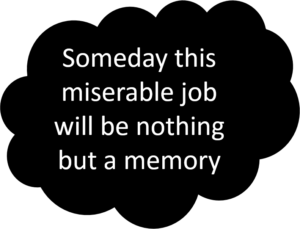
I want to quit my job…two years from now
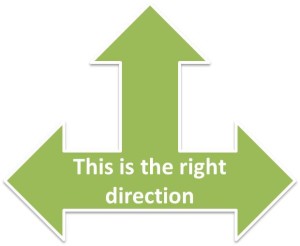 I’ve had a lot of conversations with people who tell me they want to quit their jobs, but not right now. They want to quit in two years. The most common reason is that people want to stop doing their current work and do something else…but they don’t know what that is. For some reason they think that in two years they will have figured that out.
I’ve had a lot of conversations with people who tell me they want to quit their jobs, but not right now. They want to quit in two years. The most common reason is that people want to stop doing their current work and do something else…but they don’t know what that is. For some reason they think that in two years they will have figured that out.
However, when you’re working a ton of hours in a stressful position, you don’t have much mental space or energy to determine what your next best job is. Plus, your free time is spent recovering or distracting yourself from your unhappy situation.
I feel your pain.
It wasn’t until I made up my mind that I was going to quit my job that I began to have ideas about what my future might look like. There was a definitive moment, a changing of my mindset, when I set my intention to quit. I turned my focus away from trying to make my current job situation better and focused on creating a better life. Like magic, I started getting inspired and followed my interests as far as they would go.
Here are a few examples of the actions I took and what they led to:
- After eight years without any creative writing, I started filling notebooks again. The ideas for stories, poems and lyrics popped into my head without even trying. I decided that after I quit my job I would spend a month at Naropa University’s Summer Writing Program. Once there, I wrote the outline for my self-help book for people who want to quit their jobs. I started this blog. I also kept writing creatively, joined writing groups, and volunteered with a literary magazine.
- I began researching and visiting animal sanctuaries. I documented their best practices and what they needed to improve. I have no idea if this will lead to any paid work in my future, but it was meaningful to me. The current outcome is that I have three favorite animal non-profits: Best Friends Animal Society, Chimpanzee Sanctuary Northwest and The Wild Animal Sanctuary.
- I realized that my love of research, analysis, report-writing and justice could lead to a career in private investigation. I got certified, built a marketing plan and decided this would be my next job. In case you haven’t been following my blog – I did not become a P.I. But planning to be a P.I. gave me the courage to quit my job and continue pursuing my interests until I ultimately began my consulting business.
Which leads me to this point: you don’t have to figure out your next job right now. All you have to do is follow your interests. Two years from now, your ideal job may be completely different – and better – than anything you can dream of now.
Happily, I’m not a data point of one. Many people who I spoke with followed a winding path to a satisfying career. If you need more convincing, read Martha Beck’s Finding Your Way in a Wild New World.
If you’re convinced but are thinking “what do I do now, I don’t even know what I’m interested in”, just experiment with one small, easy thing that you will enjoy doing. Make something with your hands. Revisit an old hobby. Do something you liked doing as a kid. Talk to a friend in a career that you may be interested in. Take a class or an evening workshop in a subject you are curious about. Read.
If you’re on the right track, more and more opportunities will open up to you, just as starting to write poetry again led to a month of writing classes and my book-in-progress.
When you’re not on the right track, you’ll lose interest or life will throw signs at you that it is time to change direction. For example, as I neared the date when I planned to quit my job, I began to doubt that a formal career in investigation was the right choice even though I enjoyed the process leading up to it. At the same time, a former coworker and I came up with a business idea and created an LLC in a blink. Several months later I realized our company wasn’t going to generate a salary and I moved onto my backup plan of consulting, which turned out to be a perfect career for me.
I didn’t cling to my initial idea out of stubbornness or misplaced determination. I was open to each new opportunity and was willing to move forward or change my plans as I went along. I like the metaphor of walking on a path with a lantern that only illuminates the step you’re at and where to place your feet next.
For example, if you are interested in making elaborate, one-of-a kind cakes, you don’t have to buy a bakery or launch a catering business. Have a friend or two commission desserts from you and if you enjoy it, do more. You might find that you only want to bake cakes for your loved one’s birthdays because it is a creative outlet and you feed off of their gratitude. Maybe you’ll realize you don’t want to make cakes for strangers, you don’t want to bake at all in the summer, and you really don’t want to produce a customer’s requested design if it isn’t a style you’re interested in.
When you pay attention, the universe will give you nudges in the right direction. What matters is that you are taking action. You are signaling that you are open to discovering a new path, one step at a time. If it leads you to another step forward– great! If you dislike it, or the choice generates negative results, then pursue your other interests.
If you’re one of those people who want to quit their jobs in two years, be clear about your intention. Then take one small action and you’re on your way.
Regaining Confidence After a Bad Work Experience
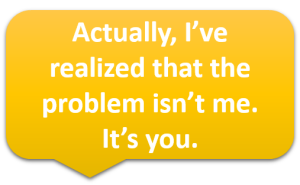 Bad jobs can hurt our souls. Humans thrive on contributing to things larger than ourselves, being productive, positive interactions with others and recognition for our efforts. A job is much more than a means to pay the bills.
Bad jobs can hurt our souls. Humans thrive on contributing to things larger than ourselves, being productive, positive interactions with others and recognition for our efforts. A job is much more than a means to pay the bills.
When a rotten manager tells you your work isn’t good enough – or you’re not good enough, it wounds your spirit. When coworkers blame and shame you, it rips little holes in your psyche. Even if you know that you add value to your company and that you do good work, even if you think your managers and their minions are idiots — constant negative feedback is damaging.
Many people who I’ve spoken with about quitting their jobs told me they lost confidence in themselves because of bad work experiences. These are people who have grown their careers, earned advanced degrees, or led initiatives that made millions of dollars for their companies. Some of them have tough reputations, and aren’t especially sensitive to criticism. Yet the negativity they endured made them unsure of themselves.
If you haven’t experienced a job like this and you’re not close to someone who has, you might be thinking, “If they were such great workers, why did their managers treat them so poorly?” Well, that is the reality of many organizations – whether military, education, corporate, religious or any other field — there is dysfunction. Often a team needs a scapegoat to blame for poor results, or to use as a target to vent their own insecurity and anger. Sometimes it is the company culture. Sometimes it is just crazy-making.
Feeling insecure about your value as an employee is not a great state to be in when searching for a new job. Interviewers can smell fear, and if you’re questioning your abilities, you may settle for a job you don’t want or accept a lower salary than you deserve.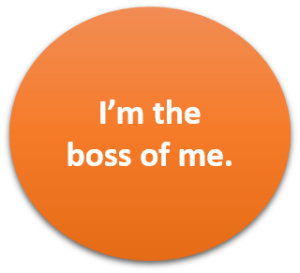
It took some people two or three years to regain their confidence and self-esteem after a terrible job, regardless of whether they were fired or quit on their own. Ugh. That is too long to let the jerks continue to have power over you. Fortunately, it doesn’t have to be this way. The people who bounced back quickly have this advice:
- Take back your power right now. Remind yourself as many times a day as you need to that this is your life. You get to choose whether you tell your coworkers “don’t talk to me like that” or quietly plot your exit while biting your tongue.
- You are more than your job. You are not your title, your company, or your salary. You are a whole person with many parts to your life. Know that your value as a human being is based on many things, but how your boss treats you is not one of them.
- You have skills and talents. When you feel low because you only hear what your manager thinks you are doing wrong, remember what you are good at. Write a list of your positive work traits if you need to. Take the Strength Finders test. Think of all you have accomplished in the past. When you’re scanning the job listings or updating your resume, this is the frame of mind to be in.
If you’ve left a horrible job or are currently in one, I hope you hold onto your self-worth and use what you’ve learned about the experience. You may come out on the other side with clearer boundaries, greater awareness of your strengths, and the confidence that comes from knowing that actually you are the boss of your own life.
Two Tips For When You Feel Stuck at Your Job
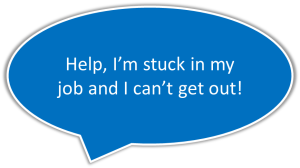 When you feel stuck in a job, you can get tunnel vision that focuses on what isn’t working.
When you feel stuck in a job, you can get tunnel vision that focuses on what isn’t working.
When you feel trapped because your salary pays the bills and provides health insurance, and gives you the means to support people who depend on you, it can seem like there aren’t very many good options. You may reject ideas about how to improve the situation or not have any ideas in the first place.
When you’re working in a job that isn’t right for you, it is draining. It is typical to feel overwhelmed and exhausted. On top of that, if you’ve been in an environment where you’ve been frequently criticized and your contributions haven’t been valued, it is common to lose confidence in your abilities.
I’ve had people tell me that they were so discouraged at work that they actually preferred being at home sick with the flu to going to the office!
This isn’t a good emotional state to begin creating a better job or work environment! But the truth is that there are many possible ways to improve work situations. It is just harder to access those possibilities when your perspective is narrowed by fear and discouragement.
One way to remind yourself that you do have options is to make a list of all the ways that your work situation can improve. This is a brainstorming-style list designed to open your mind, so including things that don’t seem realistic is actually a good idea. Things like, “My boss gets fired and a great new manager takes over the department,” or “A friend at another company recruits me to join his staff.” Or even, “I quit my job and go back to school to become a naturopathic doctor.”
If you are more visual and prefer not to write lists, mind-mapping is a great exercise. Take a blank piece of paper and jot down a single word or short phrase that represents what you’re ideal job situation would be. Then draw lines to connect the words that have common themes, and soon you’ll see patterns emerge.
Lists and mind-mapping are great ways to broaden your perspective when you feel stuck. These exercises tap into the part of your brain that has unique ideas and flashes of insight. In the short-term, taking these actions can boost your attitude by reminding you that there are many possibilities to improve your job situation. Then, with a more open mind, you might decide to pursue one of your ideas or discover a new opportunity that you might not have seen before.

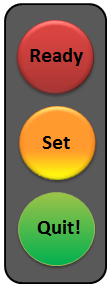 I was stuck in stop-and-go traffic for almost hour this evening. I would rather have been home already, or at least driving at a steady speed, but wasn’t really annoyed. I was on the fastest route and there was nothing I could do to make traffic move more quickly.
I was stuck in stop-and-go traffic for almost hour this evening. I would rather have been home already, or at least driving at a steady speed, but wasn’t really annoyed. I was on the fastest route and there was nothing I could do to make traffic move more quickly. 
Recent Comments